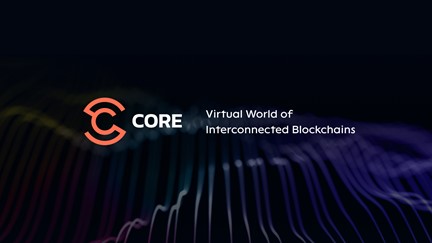
The ever-evolving blockchain technology has been around for over a decade now, but there are still various obstacles need to be addressed, such as its lack of scalability, interoperability, security and usability. Cryptographic Object Resource Engine (CORE) is a project that tries to break through these technical limitations which current blockchain solutions are facing by using some cutting-edge technologies.
“Powered by the CMCX token, CORE will provide the foundation for the future of blockchain technology allowing all blockchains, past and present to seamlessly scale and communicate,” written in the CORE Paper, an introduction to Cryptographic Object Resource Engine.
It is a grand vision that the CORE project wants to accomplish, to reach the ultimate goal, CORE created and combined some of the most advanced technologies like AI, State sharding, an enhanced consensus mechanism called APBFT, Aura Layer, Apeirogon framework and so on.
Besides these technical aspects, the CORE native token (CMCX) also plays an essential role in creating a user-driven blockchain and building a truly community-centric platform. To further expand its business and draw more attention in the market, CMCX will be listed on several exchanges including LBank Exchange. By integrating and collaborating with different platforms and tokens, CORE can tap into the support of the broader community of followers it intends to build.
The structure of CORE network
There are three fundamental parts structuring the CORE network — Pivot Chain, Poly Chains, and Bridges.
Pivot Chain is the foundation of the CORE platform, it controls the entire network and is responsible for security, consensus, and monitoring. Poly Chains run simultaneously on CORE platform, they either form instances of an existing blockchain or are independent blockchains with autonomous use cases and tokens. And there are also Bridges that allow Poly Chains, both private and public, to connect with other public blockchains like Bitcoin and Ethereum, without the use of oracles.
A network powered by AI
One of the most fascinating features of the CORE project is its usage of AI in the network. This AI model contained at the core of its blockchain helps the network reach consensus effectively and reduces the network’s overall byzantine fault, which eventually speeds up the network’s collective transaction processing times and also enables the network to operate under attacks or faults.
CORE’s AI model coordinates the various roles of each node on the network with a trust rating system, which can decide nodes’ accessibility to vital roles such as validator, observer, defender, nominator and collator. It also strengthens the security of the CORE blockchain, by randomly selecting nodes to test and collate information that identifies corrupt nodes.
Higher level of scalability via sharding
Sharding is a scaling solution that can increase the throughput of a blockchain drastically, but usually there are some potential issues around blockchain sharding including the validation of a blockchain’s state and the security risk in the reduction of nodes.
CORE’s heterogeneous sharding model proposes a secure way for adapting each shard for a specific use case. It not only resolves the high latency and low throughput of cross-shard transactions by using a two-phase commit protocol, but also addresses the lack of validity and security of shard data using erasure codes and polynomial coded sharding.
One dimension of sharding present in the CORE blockchain is State sharding. It guarantees that double spending cannot occur, and increases the transaction throughput of the CORE blockchain significantly compared to existing blockchain technology.
An enhanced consensus mechanism
CORE created Accelerated Practical Byzantine Fault Tolerance (APBFT) consensus mechanism, which enhances PBFT by reducing the communication complexity within it to address the scalability issue of it. With this enhanced consensus mechanism, each node of CORE network no longer needs to receive and count each of the remaining validators’ votes in the network but instead only receives the one multi-signature.
Building an internet of blockchains
There are lots of other cutting-edge technologies also being used in CORE project, such as Aura Layer – a unique Layer 2 scaling solution, Apeirogon framework – a robust, optimized, and efficient solution for custom blockchain development needs and so on.
The CMCX token of CORE project enables users to vote within the platform for management and developer teams. By being listed on platforms like LBank Exchange, CMCX can reach a wider range of people, and eventually boost CORE’s speed of building a larger global blockchain community. All these advanced technologies, tokenomics, and communities will help CORE to accomplish the vision of building an internet of blockchains.
Contact Details:
LBK Blockchain Co. Limited
LBank Exchange
marketing@lbank.info


















